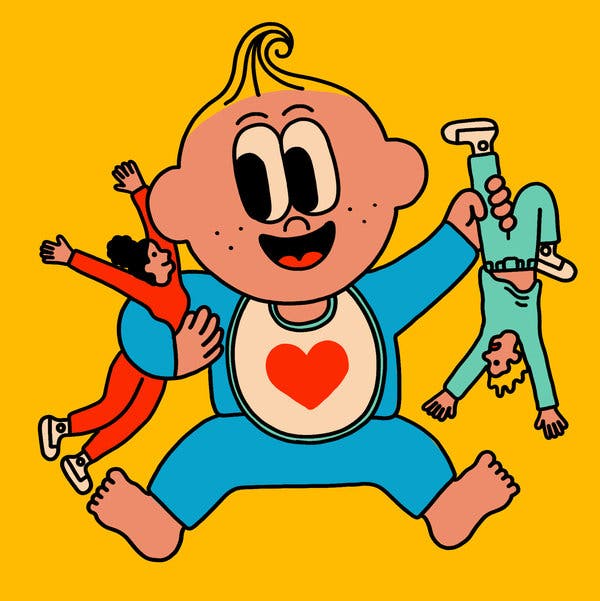Rude.
A lot of parenting questions boil down to: Is this a thing, or is something wrong? We’re doing an occasional series explaining why certain things seem to happen to your kid (or to your body or to your relationships) as your child grows. This week, we’re talking about when children prefer one parent to the other. If you have a question for a future “Is this a thing?” email us.
Q: Our toddler has a strong preference for one parent and rejects the other. We are both involved and loving — it hurts! Why is this happening? — Kristina M., Pennsylvania
A: My girls have both gone through stages where they preferred one parent over the other. With my first kid, it definitely stung when she preferred my husband. Once, during her most intense pro-Daddy stage, she asked me to leave the playground while he was pushing her on a swing. With my second kid, I relished the monthslong period when she would say “only Daddy” to everything, because by then I knew being the chosen one is often a temporary state, and meeting all your child’s needs can be overwhelming. “Only Daddy can change your diaper?” I thought, “Sounds good to me!”
Which is all to say, having a preference for one parent is very normal kid behavior. (How typical? It even happened to Cardi B. Stars, they’re just like us!) “You can count on it,” said Dunya Poltorak, Ph.D., a pediatric medical psychologist in private practice in Birmingham, Mich. There isn’t a ton of research on the topic of parental preference, though there is some evidence that when toddlers are upset, they go to the caregiver who spends the most time with them for comfort, while they do not show a preference when they are content.
So why do little kids show a preference for one parent over the other? Primarily, it’s a way to show their independence: Toddlers and preschoolers have very few outlets for autonomy (see also: the nightmare that is getting dressed in the morning), and demanding that a certain parent bring them their sippy cup is a way to assert themselves. “Children are exploring decision-making” at this age, and parental preference is one way to test it out, said Dr. Nia Heard-Garris, M.D., an attending physician at the Ann and Robert H. Lurie Children’s Hospital of Chicago. So how should you handle it? Here are some expert tips.
Respect their preference as much as you can. We are building relationships with our children for the long run, Dr. Poltorak explained, and part of creating a strong foundation is listening to their preferences, even if we think they’re unreasonable. For example, if your 2-year-old refuses to hug you and will hug only Mommy, accept it and don’t show that it bothers you.
Understand that it’s a good sign. If a child feels comfortable actively rejecting one parent, that means she’s securely attached, Dr. Heard-Garris said. That may sound counterintuitive, but if a child were unsure of a parent’s love, she would cling to any scrap of affection, Dr. Heard-Garris said. Being able to reject a parent means that a child knows the love is unconditional. You can also reaffirm your love for your child by saying something kind about her relationship with the other parent like, “You’re so sweet giving Mommy love,” Dr. Poltorak said.
Remember it’s not about you. While it is absolutely painful for many parents when their child rejects them, it’s pivotal to not take it personally. “We shouldn’t be looking to our children to build our ego,” Dr. Poltorak said. “It’s really just about what their needs are.”
That doesn’t mean your feelings are meaningless, said Dr. Pooja Lakshmin, M.D., a clinical assistant professor of psychiatry at the George Washington University School of Medicine & Health Sciences. She noted that the rejection can be particularly acute for parents who do the majority of child care. It may feel like “all the work you’re doing isn’t really being acknowledged,” she said. Instead of seeking validation from your child, you should get support from your partner or a friend.
However, if your pain is “a persistent feeling of hurt that feels sticky,” Dr. Lakshmin said, you may want to seek counseling. The experience of rejection may be bringing up needs that weren’t met when you were a child, she said, and that’s something you might want to work through with a professional.
If you are the chosen one, try to redirect. It’s not all sunshine and lollipops when you are the preferred parent — it also can mean more work. So gently redirecting a child on particular tasks can help. First, let her know that you’ve heard and accept her preference. But then, you might say something like: “Daddy is so good at tea parties. Why don’t you invite him to play?” Dr. Poltorak said.
If you’re not the chosen one, make sure the fun is spread around. If a child prefers one parent because that parent is doing more of the “fun” activities, while the other is doing the day-to-day drudgery, it’s time to reassess your balance, Dr. Lakshmin said, “So it’s not that you’re the only one enforcing brushing teeth.” She also suggested finding time “to carve out little activities or habits that can be a special bond with you and your child.” This can be as simple as a park date or a special snack-time ritual.
Follow us on Instagram @NYTParenting. and read last week’s newsletter about making awkward small talk with a new baby.


























